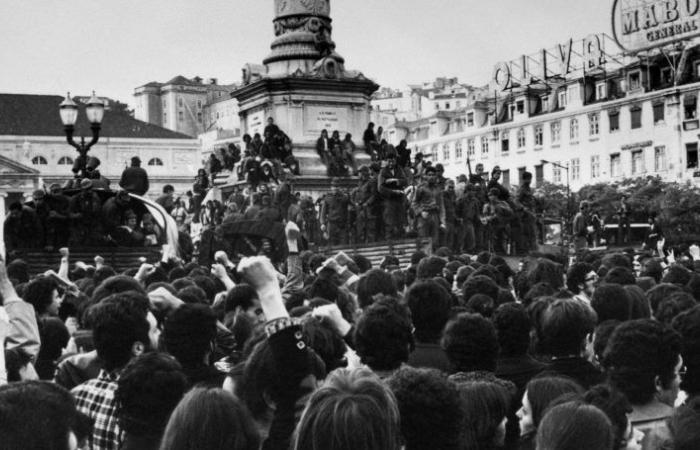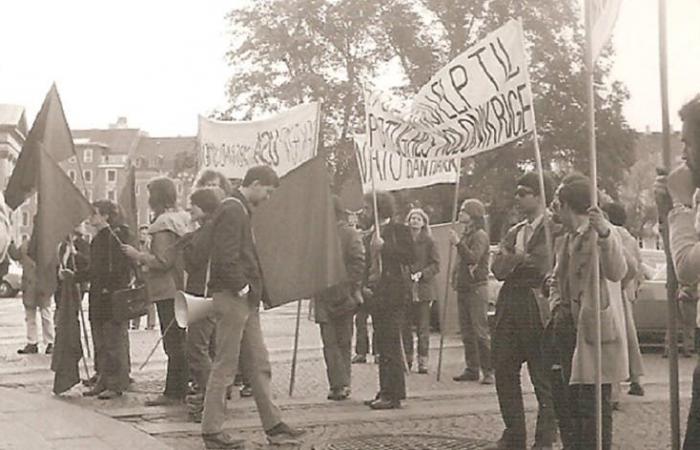“For me, the choice was always very easy from the beginning: exile was preferable to enlisting and going to war in Angola, Guinea, Mozambique, whatever it was at the time”. It is with firmness that Rui Mota, a former exile in the Netherlands, recalls his reluctance to carry out military service in the then Portuguese colonies in Africa.
He left in 1966. He was 20 years old and his determination to turn his back on Salazar’s dictatorial regime led him to cross the border to London, where he tried to ask for political asylum. The adventure, however, started badly, as England did not recognize, at the time, the Portuguese rebels or deserters, who left Portugal for reasons of the colonial war, justifying this with the fact that both countries were members of NATO.
The plan then had to change: “I contacted my friends who were from Portugal, from secondary school and who were already in the Netherlands. They informed me that, at the outset, the Dutch Government recognized the Portuguese who were fleeing the war and I went there”, says Rui Mota.
Now 78 years old, this former exile remembers well the feeling of starting life over in a strange place, but also the conviction that this was the right choice and, above all, the only one possible for him.
“I wasn’t too distressed about staying abroad for an indefinite period of time. First of all, because I didn’t want to carry out the troops and the colonial war that was implicit and, therefore, the choice was easy between going to Africa to fight for a colonial army and being exiled for an indefinite period of time”, he explains.
“For me, the choice was always very easy from the beginning: exile was preferable to enlisting and going to war in Angola, Guinea, Mozambique, whatever it was at the time. So that was never a big problem for me.”
Despite never knowing “how long I would have to stay in exile – it could be months, years – (…) andI was somehow prepared to stay as long as necessary“, account.
He ended up staying, initially, eight years. On April 25, 1974, she was on her way to classes when she received the news: a coup d’état had brought down the oppressive regime that had shadowed Portugal for decades.
Demonstration in support of political prisoners, The Hague, 1972. Photography by Rui Mota.
The first reaction, however, was not relief, but rather “a certain incredibility”. “I thought – I and most of the people who were in exile like me – that it was another coup or an attempted military coup by the so-called right”, recalls Rui Mota.
“There were a few hours of anticipation to find out if it really was a progressive military coup or not.and only at the end of April 25th did we realize that it really was a democratic coup and that, therefore, the fascist government had fallen or was about to fall”.
After several interviews given to Dutch media outlets, it was time to think about packing my bags. Rui returned to Portugal in the summer and still felt “a certain tension in the air”, so his stay did not last long.
“Given that the situation was still very difficult and it was not known very well what those social movements would lead to, and also because I hadn’t prepared my return in the short term, I didn’t want to risk it. And, since I already had a relatively stabilized situation in the Netherlands – I had already lived there for eight years, I had a scholarship, I had romantic relationships – I chose to stay there, finish the course first and only then, later, return”.
“I started to be watched”
For Joaquim Saraiva, the reason for leaving the country was identical: “I was completely against the colonial war and also against the system in force in Portugal. Just because I had some contact with some of my friends who were from [Instituto Superior] Technician, I started being watched”, he begins by telling RTP. The IST, in Lisbon, was then the scene of several anti-fascist student movements.
“I and three friends decided to leave the country and ask for asylum. There was an acquaintance in Sweden and I was going to Malmo. This decision was due to the current system, the lack of freedom of expression, the fact that any associative activity is problematic”.
“When we wanted to talk a little freely, We had to stay away from normal places, from the cafe… because there was always the suspicion that there were what were called at the time ‘the snitches’who ended up denouncing any conversation they heard against the system”, he recalls.
The match did not happen, however, as expected. On April 28, 1970, with just turned 20, Joaquim ended up having to cross the border alone, as his three companions gave up – one of them the night before.
“It was a shock, because it is completely different to go with friends or even just a friend than to go alone to a stranger”, he confesses.
“Today, no one has any idea that leaving Portugal was very complicated at that time, without documentation, without a passport, without a military license. And for those who had never left their comfort zone here – I was from the Benfica area and knew little more than Lisbon – take a step like that in the dark… It was very difficult, only those who lived through that period can tell you the difficulties that were”.
Demonstration in Copenhagen, 1973. Photography by Joaquim Saraiva.
On May 2, he arrived in Sweden, on a train he took in France, with a false passport. He was thinking about having to stay in the Nordic country for months, years or even decades. When he arrived there he asked for political asylum but, as happened to Rui Mota in London, the request was refused. The Swedish police then placed him in Denmark, where he applied again, this time successfully.
“I was the first Portuguese to arrive in the city where I was, which was the second largest Danish city, Aarhus. Then more Portuguese began to arrive and we organized a committee to support deserters and developed fighting activities in favor of the people of the colonies”.
He learned about the military coup in Portugal when he arrived at work on April 25th. “You can’t imagine that day: I was just waiting for the work day to end so I could meet the rest of my companions, to discuss and find out more about what was happening in Portugal”remembers.
Also like Rui Mota, this exile had doubts about what was happening. “Those guys, that National Salvation Board, made us a little doubtful because we had experience of what had happened in Chile the previous year, with the Pinochet coup. We were concerned about finding out more to see if the same thing would happen in Portugal. Fortunately not.”
As soon as the news was confirmed, he had no doubts. “The decision was always made that, as soon as it was possible to return to Portugal, we would return. It was the whole point almost. It was a stampede, because we were almost all deserters, rebels who were there in Denmark and we were all anxious to, as soon as we could, return to Portugal”.
For Joaquim, this return took place in June 1974.
The exiled women
“A beloved exile.” This is how Merita Andrade, now 80 years old, classifies her departure from Portugal in 1971. She was dating “a boy who didn’t want to go to war” and who, therefore, left the country. Out of love, Merita followed him.
“It was an exile, let’s say, dear, an exile that I joined of my own free will.” As a woman and therefore exempt from military service, she was able to leave more easily. “Leaving Portugal wasn’t difficult for me. I went on the train normally, like everyone else – I had to carry a passport, but that’s it, we went by train and crossed the normal borders”, she explains.
It was on that train that he arrived in Grenoble, but every year he came to Portugal by car. “Then it was more complex, because We carried things hidden in the car. We came with books against the dictatorship. I was part of a group that wasn’t exactly the Portuguese government group at that point, and so some of those trips to Portugal were complex,” he recalls.
In France, the idea was to stay as long as necessary, until the dictatorship ended. When April 25th arrived, he was on his way to school where he taught Portuguese. As she left the house she met a friend who stopped her. “You’re not going to class at all, today we’re going to celebrate,” he said. “Celebrate what?” asked Merita.
Without a television at home, I hadn’t yet seen the news about Portugal. As soon as I found out, plans for the day – and for the next few years – changed. “I really didn’t go to teach anymore. I came home and told Zé Carlos (her boyfriend at the time) ‘look, there’s a revolution in Portugal’, and no one wanted to believe it”.
They ran through the neighborhood, where several Portuguese people who had fled the war lived, to share the good news. On that day “there was no longer any work for anyone”. Plans then began to return to Portugal, which for Merita could not be immediate, as she was pregnant.
The partner, who had gone to Portugal shortly after the revolution, returned for the birth of his daughter. They returned later, with their complete family, and celebrated their freedom in Vila Nova de Ourém, where they went to live.
“He and I were part of a revolutionary movement, let’s say. And we had meetings, meetings with a lot of people from this movement and, therefore, it wasn’t exactly a continuous party, but we often met at meetings and talked about it”, he states.
It was in these meetings that they discussed what they could do for Portugal, since “the country was in need of a great cultural revolution and even education”.
A key piece of the revolution
The revolution took place in Portugal, but it would not have been the same without those who were abroad. “I think the role [dos exilados]despite being passivein the sense that we were not directly linked to the country – we were living abroad, therefore, it was not an explicit activity – was quite important in the sense in which we were organized”, considers Rui Mota.
The former exile explains that most of the deserters and rebels were organized in committees, social organizations, collectivities, associations, and media outlets. “And those most active, who were a minority, objectively, were often in the Dutch news. They gave interviews, were invited to talks, to television, to radio, etc. I myself gave a series of interviews during those years I was in exile,” he says.
“Because in Holland, at the time, there was a large anti-colonial movement, not only in relation to the Portuguese colonies, but also in relation to Vietnam, the Algerian war, etc. And therefore, the Dutch were very committed at that time and there were very strong solidarity committees that publicized anti-colonial struggles, including the Portuguese ones”.
For Joaquim Saraiva, the exiles had “a share in making the 25th of April possible at that time”. One of the reasons was the fact that the absence of this large number of Portuguese led to a lack of labor, which, in turn, aggravated discontent in Portugal and contributed to accelerating the revolutionary process.
Merita Andrade believes that the large number of deserters and rebels helped to clarify public opinion. “Nobody wanted that colonial war anymore, nobody believed in it anymore and, therefore, the revolution was something that would bring change”he emphasizes.
After the 25th of April, many of the exiles who returned continued to play an active and central role in the post-revolution period. “I still remember that in Ourém, which was where I lived when we came from France, we felt in the general population a desire to do things in favor of the so-called poor people at the time, people who were not fascists”.
In this sense, he took some literacy courses and, as a social worker, he even followed “very dramatic” cases of children. These are times that he remembers with sadness and that he hopes will not be repeated. “May the Carnation Revolution keep you forever. May we never go back”wait.
Tags: April Portuguese escape dictatorship exile
--






